Introduction
How Long Can Rabbits Go Without Food: The captivating world of rabbits is one of curiosity and wonder, and their unique behaviors and adaptations often lead us to seek deeper understanding. Among the intriguing questions that arise, the inquiry into how long rabbits can go without food emerges as a topic of consideration. As caregivers and enthusiasts, exploring the limits of a rabbit’s endurance without sustenance offers insights into their physiology, survival strategies, and the importance of responsible care. Join us as we delve into the fascinating realm of rabbit biology and the factors that determine their ability to endure periods without food.
Rabbits, those charming and delicate creatures, have long captured our hearts with their endearing behaviors and unique traits. Yet, amidst the enchantment of their presence, questions about their well-being and survival needs arise. One such question that prompts both curiosity and concern is Delving into this inquiry takes us into the realm of rabbit physiology, their adaptations to the wild, and the critical role that proper care plays in ensuring their health and vitality.
Rabbits, both wild and domesticated, have evolved a set of remarkable survival strategies that enable them to navigate their environments. Among these adaptations is the ability to conserve energy and endure periods of scarcity. Understanding these strategies sheds light on how rabbits manage without food for extended periods.
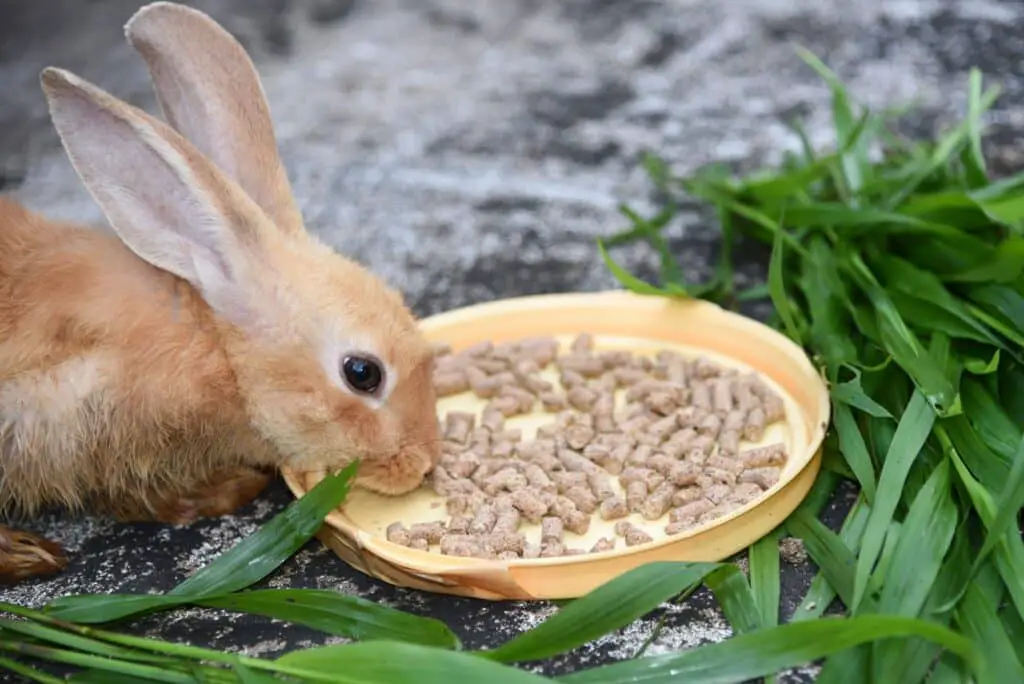
What happens if a rabbit doesn’t eat for 24 hours?
If they stop eating, their digestion comes to a halt and the rabbit will start to go into Gastrointestinal (GI) Stasis. If left untreated, the condition can easily end up being fatal in rabbits. They need to go see a vet as soon as possible so that they can receive medication to help get their digestion moving again.
Rapid Metabolism
Rabbits possess a rapid metabolism, reflecting their herbivorous nature and the need to process fibrous plant material efficiently. This quick metabolic rate requires a consistent intake of food to sustain their energy levels and overall bodily functions.
Gastrointestinal Health
The rabbit’s digestive system is a delicate mechanism that relies on a steady supply of fiber to function properly. A 24-hour absence of food can disrupt the digestive process, leading to issues such as gastrointestinal stasis, where the digestive tract slows down or stops moving. Gastrointestinal stasis can result in discomfort, pain, and potential complications if left untreated.
Nutritional Imbalance
Beyond the immediate effects on digestion, a 24-hour fasting period can also lead to nutritional imbalances. Rabbits require a variety of nutrients, vitamins, and minerals for their well-being. Depriving them of food for even a short period can impact their overall health and compromise their immune system.
Impact on Behavior
Hunger and discomfort resulting from a lack of food can influence a rabbit’s behavior. They might become lethargic, restless, or exhibit signs of distress. Changes in behavior can be indicators of their discomfort and should prompt immediate attention.
Water Intake
Water is a crucial aspect of a rabbit’s diet, and a lack of food might also lead to reduced water intake. Dehydration can exacerbate the negative effects of food deprivation and further compromise their health.
Veterinary Attention
If a rabbit goes without eating for 24 hours or shows signs of distress, it’s essential to consult a veterinarian who specializes in rabbit care. A veterinarian can provide guidance and interventions to address any potential issues and ensure the well-being of the rabbit.
Preventive Measures
To prevent such situations, it’s crucial to provide rabbits with a consistent and appropriate diet. High-quality hay, fresh vegetables, and suitable rabbit pellets should form the foundation of their nutrition. Treats should be offered in moderation and not replace their primary food sources.
How long can bunnies go without food and water?
After 12 hours: Your rabbit’s digestion will slow down, which puts them at risk for GI stasis. After a day: Without food or water, your rabbit will likely become dehydrated, eventually leading to kidney malfunction. After a couple of days: Organ malfunction will become fatal.
Food and Water as Lifelines
Food and water are crucial elements in a rabbit’s life, sustaining their energy, bodily functions, and overall health. Understanding their ability to endure periods without these essentials provides insights into their survival tactics.
Food Deprivation
Rabbits have adapted to endure short periods without food due to their highly efficient digestive systems. In the wild, where food availability can fluctuate, rabbits can go without food for around 12 to 24 hours before their metabolic reserves are significantly affected.
Water Deprivation
Water is equally vital for rabbits, as it facilitates digestion, regulates body temperature, and maintains overall bodily functions. Bunnies are less equipped to endure water deprivation compared to food deprivation. They can become dehydrated within hours if denied access to water.
Survival Strategies
Rabbits have developed survival strategies that allow them to manage food and water scarcity. They can enter a state of reduced activity to conserve energy, and their kidneys are adapted to reabsorb water from urine, helping them maintain hydration during dry periods.
Health Implications
Prolonged deprivation of food and water can lead to serious health issues. Without proper nourishment, rabbits might experience gastrointestinal stasis, organ dysfunction, and weakened immune systems. Dehydration can cause lethargy, weakness, and potential organ failure.
Responsible Care
As caregivers, it’s our responsibility to provide rabbits with consistent access to food and water. A balanced diet that includes high-quality hay, fresh vegetables, and appropriate rabbit pellets supports their health and vitality.
Environmental Considerations
In domestic settings, rabbits should always have access to clean water and appropriate food. During hot weather, hydration becomes even more crucial, as rabbits are prone to heat stress.
Veterinary Attention
If a rabbit goes without food or water for an extended period or shows signs of distress, consulting a veterinarian who specializes in rabbit care is essential. Professional guidance can address any potential issues and ensure the well-being of the rabbit.
What if my rabbit hasn’t eaten in 2 days?
However, rabbits that don’t eat for even just a day are in a life-threatening situation and require immediate veterinary attention. Don’t delay and, even while you’re trying home remedies, give your vet a call for a phone consultation. Start with some mixed-vegetable baby food and a syringe.
Observing Behavior
Rabbits can occasionally have variations in their eating patterns due to factors such as stress, changes in environment, or minor digestive issues. However, a 2-day period without eating is a significant deviation from their usual behavior and might indicate an underlying problem.
Possible Causes
Several factors could contribute to your rabbit’s lack of appetite:
Stress: Changes in their surroundings, new additions to the household, or exposure to loud noises can stress rabbits and affect their eating habits.
Illness: Dental problems, gastrointestinal issues, infections, and other health conditions can lead to reduced appetite.
Pain: Rabbits might avoid eating if they’re in pain, especially if they’re experiencing discomfort while chewing or swallowing.
Blockages: Ingested foreign objects or hairballs can cause blockages, leading to digestive issues and a loss of appetite.
Hydration and Gut Mobility
A lack of food intake for 2 days can also lead to concerns about dehydration and slowed gut mobility. A rabbit’s digestive system relies on a steady intake of food to keep things moving. If the digestive process is disrupted, it can result in gastrointestinal stasis, a condition where the digestive tract slows down or stops moving.
Action Steps
If your rabbit hasn’t eaten in 2 days, consider taking the following steps:
Observe: Monitor your rabbit closely for any other changes in behavior, energy levels, or stool consistency.
Offer Hay and Water: Ensure that hay and water are readily available. Encouraging hay consumption is crucial for maintaining gut health.
Consult a Veterinarian: If your rabbit’s lack of appetite persists or is accompanied by other symptoms, such as lethargy, bloating, or abnormal stool, seek professional advice from a veterinarian who specializes in rabbit care.
Veterinary Guidance
A veterinarian will be able to conduct a thorough examination, diagnose any underlying issues, and recommend appropriate treatment. Timely intervention is crucial to address potential health concerns and restore your rabbit’s well-being.
Preventive Measures
To prevent such situations, maintain a stable and stress-free environment for your rabbit. Offer a balanced diet, provide plenty of fresh water, and ensure regular exercise and mental stimulation.
What if my rabbit hasn’t eaten for 3 days?
Contact your vet immediately if you notice your rabbit not eating properly. It’s important to have them examined as soon as possible to prevent them developing any further complications. Emergency – if your rabbit has stopped eating, it’s important to contact your vet as soon as possible.
The well-being of our beloved rabbit companions is a top priority, and any deviation from their normal behavior can spark worries. If your rabbit hasn’t eaten for 3 days, it’s understandable to be concerned. This situation prompts a need for close observation, action, and potentially seeking professional guidance to ensure the health and happiness of your furry friend.
Elevated Concerns
A rabbit not eating for 3 days is a more significant cause for concern compared to shorter periods of reduced appetite. A lack of food intake for this duration can lead to more serious health issues, including gastrointestinal stasis and malnutrition.
Veterinary Guidance
Timely intervention is crucial to address potential health concerns and restore your rabbit’s well-being. A veterinarian can provide tailored guidance based on your rabbit’s specific needs and condition.
Preventive Measures
To prevent such situations, create a stress-free environment, offer a balanced diet, provide plenty of water, and ensure regular exercise and mental stimulation.
Why did my 3 year old rabbit died?
Loud sounds, such as cats, dogs, loud music, or screaming can lead to a heart attack and put a rabbit into shock, causing sudden death. It can take several days for the rabbit to die this way, and it does not happen often, but it is quite possible.
Diet and Nutrition
A proper diet is crucial for a rabbit’s health. If a rabbit doesn’t receive the necessary nutrients, it can lead to malnutrition, weakened immunity, and overall decline in health.
Environmental Factors
The environment in which a rabbit lives plays a significant role in its health and well-being. Factors such as temperature extremes, poor living conditions, stress, and exposure to toxins can negatively impact a rabbit’s health.
Genetics and Breed Predispositions
Certain rabbit breeds are more prone to specific health issues due to their genetics. It’s possible that certain conditions or vulnerabilities were present in your rabbit’s genetic makeup.
Veterinary Care
Regular veterinary check-ups and early intervention can greatly impact a rabbit’s health. If health issues were left untreated or undiagnosed, they could have contributed to the rabbit’s passing.
Do rabbits get bored in their cage?
If rabbits live in small hutches with nothing to do and no space to move, they get bored. Boredom can cause some serious health problems: Bored rabbits will fill their time by eating. If they eat too much and don’t move around they’ll put on weight.
The enchanting world of rabbits is one of curiosity, agility, and social interaction. However, when confined to a cage for extended periods, rabbits can indeed experience boredom and its associated consequences. Understanding their natural behaviors, social nature, and the importance of mental and physical stimulation sheds light on the potential challenges posed by a lack of enrichment in their living environment.
The Nature of Rabbits
Rabbits are inherently active and curious creatures. In the wild, they spend their days foraging, exploring, and interacting with their environment. This natural behavior is deeply ingrained, and when confined to a cage without outlets for these activities, they can become frustrated and bored.
Cage vs. Space
While cages are often necessary for safety and security, they shouldn’t serve as permanent confinement. Instead, they should be seen as a safe retreat. Offering a larger play area or even creating a rabbit-proofed room for supervised exploration can greatly enhance their well-being.
Human Interaction
Interacting with your rabbit is vital for their mental and emotional health. Gentle petting, talking to them, and spending quality time together builds a strong bond and alleviates potential boredom.
Can rabbit survive with water only?
They can lose nearly all their body fat and survive. However, a loss of only 10 percent of their body water can be fatal. Your rabbits can miss a feeding sometimes, but should have a good fresh supply of water every day. In fact, if you don’t give your rabbits drinking water for even one day, they could die.
Nutritional Complexity
Rabbits are herbivores with intricate dietary needs. Their digestive systems are adapted to process fibrous plant materials, primarily hay, grass, and leafy greens. A diet solely consisting of water lacks the essential nutrients, fiber, vitamins, and minerals required for their overall health and vitality.
Gastrointestinal Health
The rabbit’s digestive system is highly specialized and relies on a steady intake of fiber to maintain proper gut motility. Without the necessary roughage from plant-based foods, their digestive process can be disrupted, leading to issues such as gastrointestinal stasis, bloating, and discomfort.
Malnutrition
A water-only diet would lead to severe malnutrition in rabbits. They would lack essential nutrients such as protein, carbohydrates, vitamins (like vitamin C), and minerals (like calcium), which are vital for their growth, energy, and immune system functioning.
Dehydration and Water Balance
While water is crucial for survival, it cannot replace the nutritional needs provided by a well-rounded diet. Dehydration resulting from a lack of food can exacerbate health issues and compromise their well-being.
Veterinarian Guidance
Attempting to provide a rabbit with a water-only diet is both ethically and biologically unsound. Consult a veterinarian who specializes in rabbit care for guidance on proper nutrition, feeding, and providing a balanced diet.
Natural Diet
In both wild and domesticated settings, a rabbit’s diet should reflect their natural behaviors and dietary preferences. A diet based on hay, fresh vegetables, and appropriate rabbit pellets aligns with their nutritional needs.
Can a rabbit survive on just hay?
Rabbits’ food should be as close as possible to their natural diet, of mostly grass or hay. In fact, rabbits could live on hay and water alone, but we recommend fresh leafy vegetables and a little commercial feed.
Hay’s Nutritional Value
Hay is more than just a filler; it’s a nutritional powerhouse for rabbits. It provides essential fiber that aids in digestion, prevents gastrointestinal issues like stasis, and helps maintain healthy gut bacteria. Additionally, hay offers a balance of nutrients, including carbohydrates, protein, vitamins, and minerals, that are essential for a rabbit’s overall health.
Dental Health
Rabbit teeth have a continuous growth pattern that requires regular wear to prevent overgrowth and related dental problems. Chewing on hay provides the necessary abrasive action that keeps their teeth in check. A diet primarily consisting of hay encourages natural chewing behaviors and supports dental health.
Hydration and Weight Management
Hay contains a significant amount of moisture, contributing to a rabbit’s hydration. While not a substitute for water, this moisture content is beneficial for overall well-being. Additionally, the high fiber content in hay helps regulate a rabbit’s weight by promoting a sense of fullness and preventing overeating.
Variety in Diet
While hay is a foundational element, it’s not a complete diet on its own. Rabbits are herbivores with diverse nutritional needs. A diet solely based on hay might lack certain vitamins and minerals essential for their health. Fresh vegetables and high-quality rabbit pellets should complement hay to ensure a well-rounded diet.
Long-Term Health
Rabbits can certainly thrive on a diet where hay is the primary component, but dietary variety is key to their long-term health. Introducing different types of hay (timothy, orchard grass, etc.), leafy greens, and appropriate pellets ensures they receive a spectrum of nutrients necessary for their growth and vitality.
Consult a Veterinarian
To ensure your rabbit’s well-being, consult a veterinarian who specializes in rabbit care. They can offer guidance on the appropriate balance of hay, vegetables, and pellets based on your rabbit’s age, weight, and specific needs.
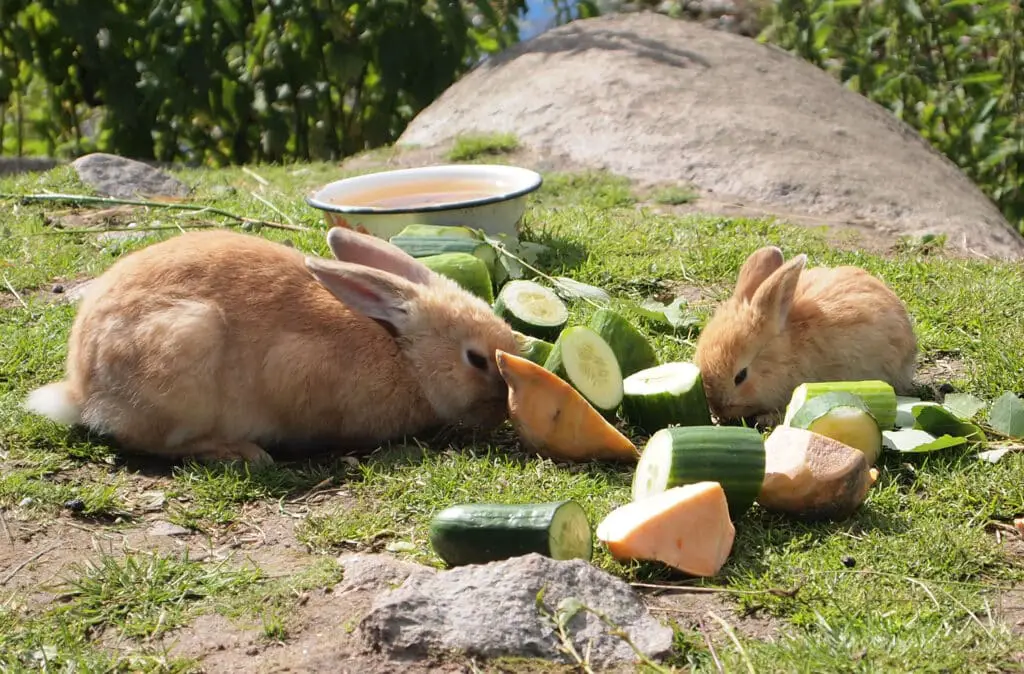
Conclusion
In the intricate tapestry of rabbit biology and survival strategies, the question of how long rabbits can go without food leads us to appreciate the delicate balance between adaptation and care. While wild rabbits possess mechanisms to endure periods of scarcity, domesticated rabbits rely on their caregivers for sustenance.
The exploration into this question highlights the responsibility we hold as stewards of these beloved creatures. Proper and consistent feeding schedules are essential to ensure the well-being of rabbits under our care. Whether wild or domesticated, rabbits depend on a regular intake of food to maintain their health, energy, and vitality.
As we reflect on the endurance capabilities of rabbits, we are reminded of the fundamental role we play in providing them with a stable and nurturing environment. By understanding their biological needs and catering to them, we honor the wonder of these gentle beings and contribute to their flourishing in our shared world.

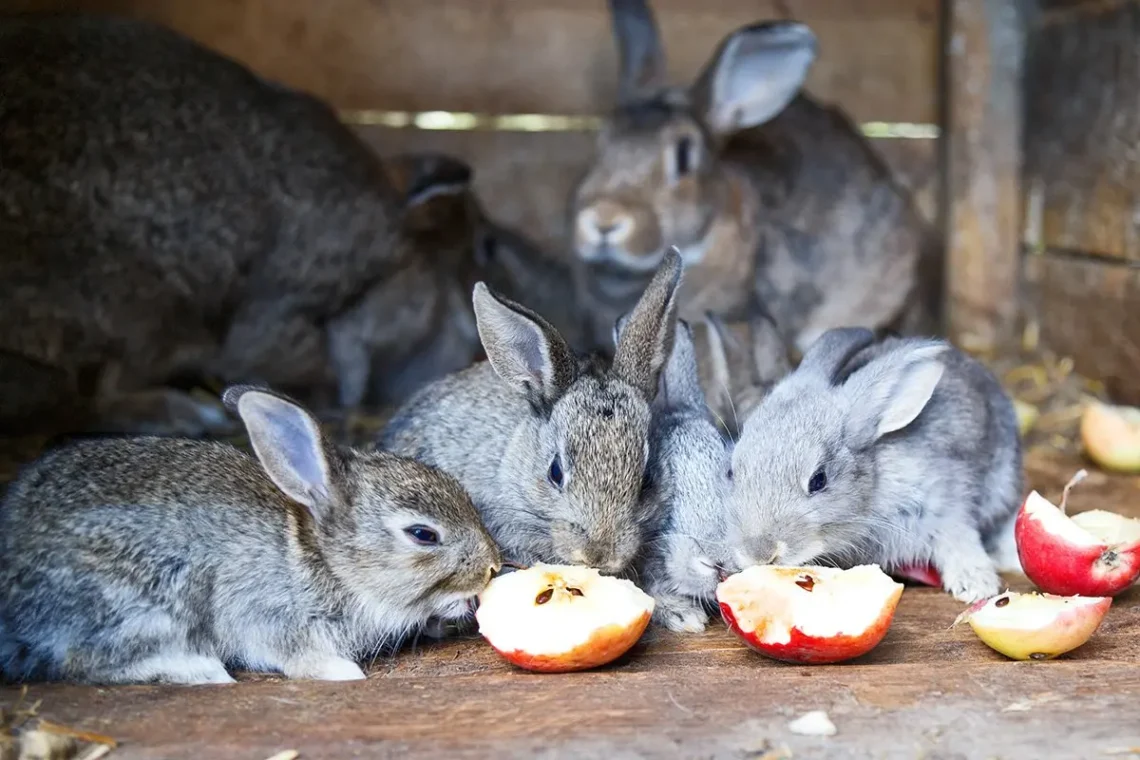
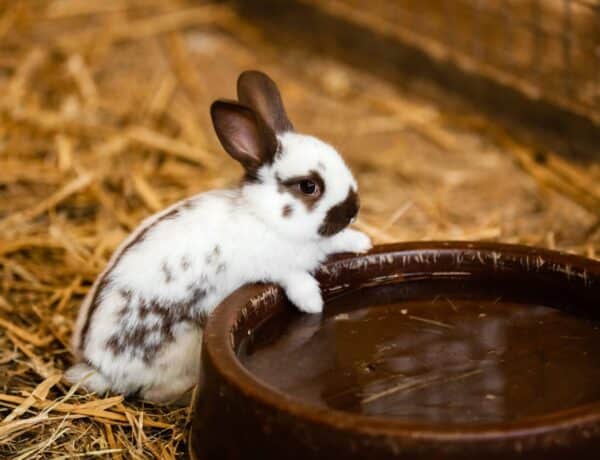
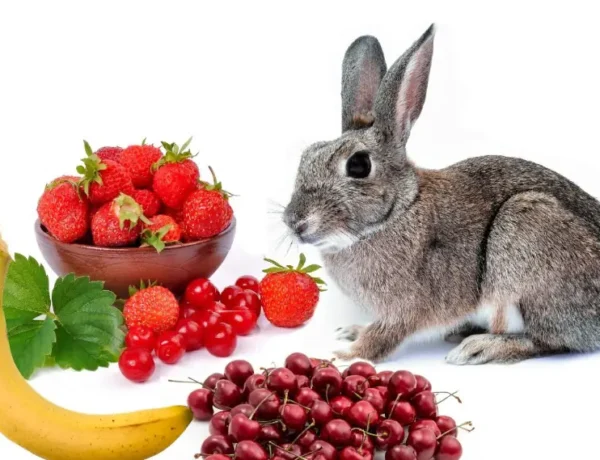
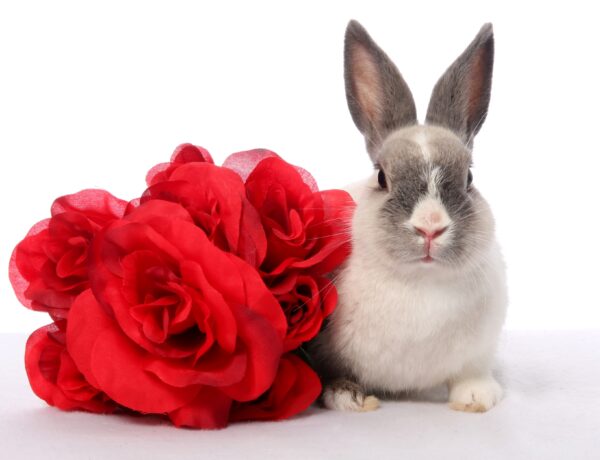
No Comments